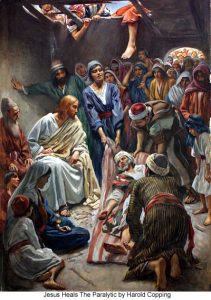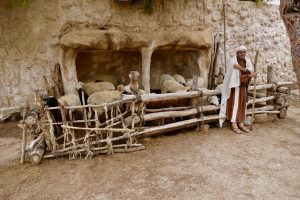Redeemed and Ransomed by the Lord
(Is 35:1-10; Ps 85; Lk 4:17-26)
******************************************
The movie Argo depicts the liberation of American hostages from their captivity in Iran with the help of Canada. Imagine the feelings of those hostages as their feet touched freedom for the first time in months.
The readings today remind us we are all hostages in one form or another, and that we have been not only redeemed but also ransomed by Jesus Christ, and have every right to feel joyful gratitude expressed through selfless service.
The prophet Isaiah in the first reading speaks of a time in the future when the desert will be transformed into fertile land flowing with fresh water, people will be healed of all their infirmities, and God will both redeem and ransom God’s people.
For its part, Psalm 85 promises God will come to save God’s people, and there will be peace, justice and the experience of God’s steadfast love.
In the gospel, we see it all being fulfilled in dramatic fashion, building up to a climax much like a movie, yet more true to life than even the movie Argo. While that movie was highly acclaimed after it was released, it was also criticized for diminishing the Canadian input into that covert operation, some false portrayal of the British and New Zealand Embassies, and exaggerating the dangers the hostages faced in escaping the country.
The gospel is high drama with much deeper, more profound biblical, spiritual and historical significance than any movie. Imagine the scene. While Jesus was teaching, “the Pharisees and teachers of the law were sitting nearby (they had come from every village of Galilee and Judea and from Jerusalem); and the power of the Lord was with Jesus to heal.
Scripture scholars stress every word in the bible is important and significant, understandable since they were laboriously written by hand with pen and ink. So, we need to ponder and try to comprehend what these words are trying to convey. The Pharisees were convinced if they kept the Law perfectly, then the shekinahor glory of God would return to the second temple. That glory had manifested itself at the dedication of the temple of Solomon, and then abandoned it because of corruption during the time of Ezekiel, but had not returned when the second temple was dedicated. The teachers of the law would be the scribes, the experts on the scriptures, who should have been able to discern the prophecies they so assiduously pondered were all about Jesus.
They had come from every village of Galilee and Judea, so the whole country was represented – it was a national gathering of experts in scripture and spirituality. On top of that, they had come from Jerusalem, the heart of the religious life of the nation, where the temple was located, and where God dwelt within the Holy of Holies, behind a heavy curtain, and into which only the high priest could enter once a year on the day of Atonement, after he had purified himself. This was a very unusual, high level gathering in the most unlikely of places, the Galilean countryside.
Then, the punch line – we are told “the power of the Lord was with Jesus to heal.” In a movie, the music plays a critical role – building up suspense and warning us something dramatic is about to happen – without a word being spoken – we can tell just by intensity of the music.

Then it happens – some men, desperate to bring a paralytic to Jesus for healing, resort to breaking through the roof to drop the man “through the tiles into the middle of the crowd in front of Jesus.” Our guide in the Nazareth Village in Galilee told us that was quite easily done, given how the roofs were constructed in those times.
But imagine the noise, the commotion, the dust, and the drama of this stretcher dropping down right in the middle of that high level gathering of distinguished religious leaders and scholars. I saw a painting of these scene I loved – the sun streaming through the hole in the roof, and the paralytic and Jesus barely visible in all the dust and debris!

Nazareth Village Shepherd
But then the plot thickens. Jesus, seeing the faith of the friends who went to that extent to help the paralytic, speaks very unusual words to the paralytic – “Friend, your sins are forgiven you.”
What is that about? They had brought the paralytic for physical healing, and Jesus first forgives him all his sins. Those words were not lost on the scribes and Pharisees, who immediately pounced on them as blasphemy, for only God can forgive sins. As it is so often in a movie, the audience knows better what will happen than the characters. We know what these religious leaders, who should have known with their knowledge of the scriptures, but don’t know and to this day refuse to acknowledge – that Jesus, the Son of Man, is also the Son of God – God made flesh, and revealing to us the depth of the Father’s love for us, first of all through the most important reality of all – the taking away of all our sins.
The reaction of the Pharisees and scribes, in their mis-interpretation of scripture and their stubborn unbelief, is to logically accuse Jesus of blasphemy, because as they themselves assert, only God can forgive sin. So, to help them out, to show that he has the authority on earth to forgive sins (that he is God in the flesh doing what God does), Jesus goes one step further – he tells the man to stand up and walk and the paralytic, who absolutely could not walk, gets up, even picks up what he had been lying on, and went to his home, glorifying God.
In this account from Luke, we are told the response of the people is amazement, awe, and giving glory to God. We are not told the response of the Pharisees and scribes, but we know from parallel accounts that in their spiritual blindness and stubborn refusal to believe, they were infuriated, completely missed the meaning of the miracle, and started to plot to kill Jesus. What divine irony, and that is where this plot ends for today.
The meaning for us is the paralytic is all of us. We have all suffered from a lack of love in one form or another as no family is perfect in this world. We have all put up protective walls of false pride, buried anger and resentment, suffered from sadness and self-pity at our losses, and are carrying guilt and fear from the way we acted out of that pain and hurt other people. Some of us even have gone so far as trying to save ourselves by over-attaching ourselves to the false gods of possession, prestige and power, even becoming addicted to them.
It is like we are in a spiritual cage, and all we need to do is humbly admit our need for both forgiveness and healing, and there at the bottom of our spiritual cage we will find a small door called humility that is our key to freedom. Jesus as the Messiah came with a two-fold mission – to redeem and to sanctify, to forgive and to heal. That is why the healing of the paralytic involved both forgiveness, and healing. And once we have received that forgiveness and healing, in whatever way we needed it, our response should be not only joyful gratitude and awe, but also following Jesus along the way by sharing this good news and loving others as he has loved us.
The depth of that love was manifest, not just as redemption (the forgiveness of our sins) but also as a ransom (the sacrifice of Jesus’ own life on the cross). The hostages were freed from Iran without a ransom being paid – but in Jesus, we are both redeemed and ransomed.
The Eucharist is an experience of both forgiveness, especially through the penitential rite, and healing, as we commune with and receive the very body and blood of Jesus. As we celebrate, we are being redeemed and ransomed.
May our celebration strengthen our faith in Jesus as the Messiah, lead us to experience his forgiveness and healing in our own lives, and share his love with others as the redeemed and ransomed of the Lord.




When we strengthen our faith in Jesus Christ as the Messiah then we are redeemed and ransomed. His teachings and words will lead us to his experience his forgiveness because he taught us to forgive one another. As one of his commandments we are suppose to forgive people who have hurt us time and time again. We are to forgive ourselves by going through reconciliation and confess all our sins. We should ask God to forgive our sins and heal us from any more sins inside . On the other hand, he will heal us from any sickness we are suffering from just like the paralytic man. The man beg Jesus to heal him because he can’t walk; so he just heal his paralytic also forgave him for all his sins. We can do the same by willing to come to our senses that we want to forgiven and healed. So, we are hostages as we experience Jesus’ love and gratitude towards people. Amen
Thanks again Bishop Sylvain for sharing the homilies and pictures related to the readings. We are born to be servants of God and missionary disciples when we totally believe in him. Gracias !